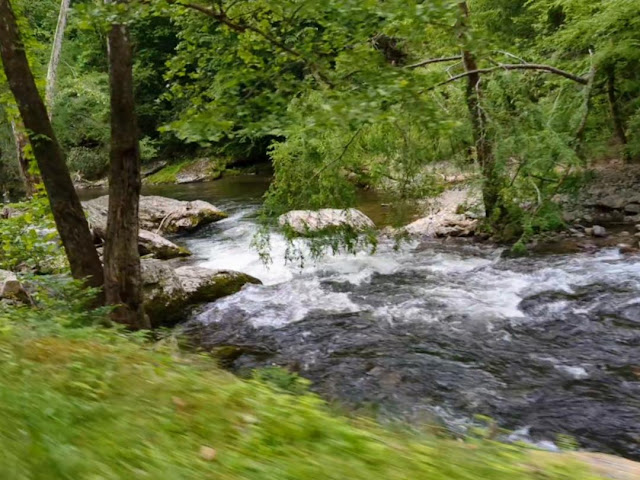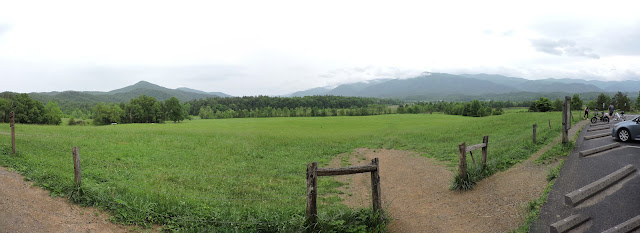One
of the reasons I wanted to tour the Smoky Mountains (besides going on another
memorable trip with my Besties) was to be able to see where some of my direct
ancestors had lived. I had been surprised to learn, in my research for an
ancestral biography I was writing, that many of my Stewart, Franklin and Sevier
ancestors all had homesteaded around North Carolina and Eastern Tennessee as far back as
the 17th century. I wondered
what was so special about this particular area that had drawn my several times great-grandparents to it? This trip was going to be so much more exciting because of
the possibility of connecting with them in a deeper way, and I knew that would
only be possible when I could immerse myself in the areas where they had lived.
WHERE
ARE THEY AND ARE THEY REALLY SMOKY?
After my friends and I arrived in Asheville, North Carolina, we began to hear the terrain around us called by several names: Smoky Mts., Blue Ridge Mts., and the Appalachians. At first it was confusing until I looked at a topographical map and saw that they are all a part of a large chain of mountains that stretch from Maine to Mississippi. The Smokies encompass the entire area between North Carolina and Tennessee and are a smaller mountain range bordered by the Blue Ridge Mts. to the south and the Appalachians to the north.
Double click on the picture for a full screen view.
The Cherokee Nation considered these mountains sacred and named them, “the place of blue smoke,” which the early pioneers translated to Smoky Mountains. And, they truly do emit a blue colored fog, which surprisingly comes from plants. Plants emit a natural gas that have a distinctive scent but they also release vapor, and that vapor, together with millions of other plants, creates a smoky appearance. The bluish tint of the fog also comes from the gas in the vapor by scattering blue light from the sky. It indeed gives one the feeling of ethereal spirituality the Cherokee Nation honored.BREEZING THROUGH THE SMOKIES
Skirting around the northern edge of the Smokies on the I-40, we left Ashville, NC and headed for Gatlinburg, TN where we settled into our motel (more on this Appalachian experience later!) We looked forward to taking a daytrip through a very iconic part of the Smokies called Cades Cove, an isolated valley located about an hour and twenty minutes from Gatlinburg.
Just getting there felt like a fireworks show. Every turn of the bend was a 'Wow!" moment. The scenery is absolutely breath-taking, so lush and thick with emerald green vegetation. We stopped first at the awesome Sugarland’s Visitor’s Center where we loaded up on maps and souvenirs. (Don't miss stopping here! It is probably the best visitor's center I've ever seen.) From there we followed the winding route of the Little River; every square inch
of which is absolutely gorgeous!
The
states of Tennessee and North Carolina saw the tremendous value in preserving
the area for the enjoyment of all people and began to buy up the land to donate
to the Federal Government in 1927. It officially became a National Park in
1934. Because of their visionary efforts, many of the original log cabins,
churches and settlements were preserved.
GATLINBURG, GATEWAY TO THE GREAT SMOKY MOUNTAIN NATIONAL PARK
Gatlinburg
lies in a tiny valley with towering mountains rising up on either side filled
with trees, vines and lush vegetation. Visually it is a pleasant place to be for the three days we were there, but unfortunately the town’s main
income, tourism, has blighted the landscape. We took a ride down main street
and were shocked by the wall-to-wall commercialism. It seemed to be comprised
of one noisy arcade or fast-food shop after another. And, even though it wasn’t
tourist season, the place was full of people, most with children in tow. On a walk after
dinner one night, we discovered a shop selling all things Trump next door to a
store that sold all things sharp and lethal. I could have bought a really nice set of brass knuckles or a key ring made
of a shotgun shell with my name on it. But I resisted the temptation.
Our
motel, advertised as a 4-star establishment, was woefully overstated. First of all, the bedsprings squeaked
(which actually made us laugh every time someone moved), a lamp was missing,
leaving an exposed electrical box, no coffee maker (we had to go down a steep
hill to the office and make our own), and a combination cramped bathtub, sink and clothes
rod (no closet) was so small, we had to take a number to use it.
Oh, and the view! I dubbed it “The Hatfield and McCoy Cottage” complete with laundry facilities and a sofa bed on the veranda for those unexpected guests. The trailer seemed to be a permanent fixture serving as shade for a makeshift vegetable garden grown underneath. And this place wasn’t exactly cheap. A survey of other nicer looking places to stay revealed obscenely high prices, so our Appalachian accommodations didn’t seem so bad after that.
Of
course, there are many nice places to go in Gatlinburg, wonderful dining and shops
galore that sell hand crafted items—just not on the main street of town. So do
your homework and you will enjoy your stay! Also, remember that the Great Smoky Mountains National Park is the most visited National Park in the Nation so try to avoid visiting during the height of the season!
NEXT TIME: Sevierville, Pigeon Forge and Dollywood!
💖Remember to be kind, ya'll!









Nicely done!
ReplyDeleteI enjoyed the pictures and descriptions of the places you saw. Looking forward to the next one! Thanks!
ReplyDeleteHi Jude! Thanks so much for letting me know how you like the blog! You have been a faithful reader from the start and l really appreciate it. I know you realize how much time and effort it takes to put together one of these and to know that you read them and actually enjoy them is my joy.
DeleteThis is great Barb and so captures our experience! Had to laugh at your accurate description of our “accommodations”!
ReplyDeleteFun to read and good descriptions. Makes it come to life.
ReplyDelete